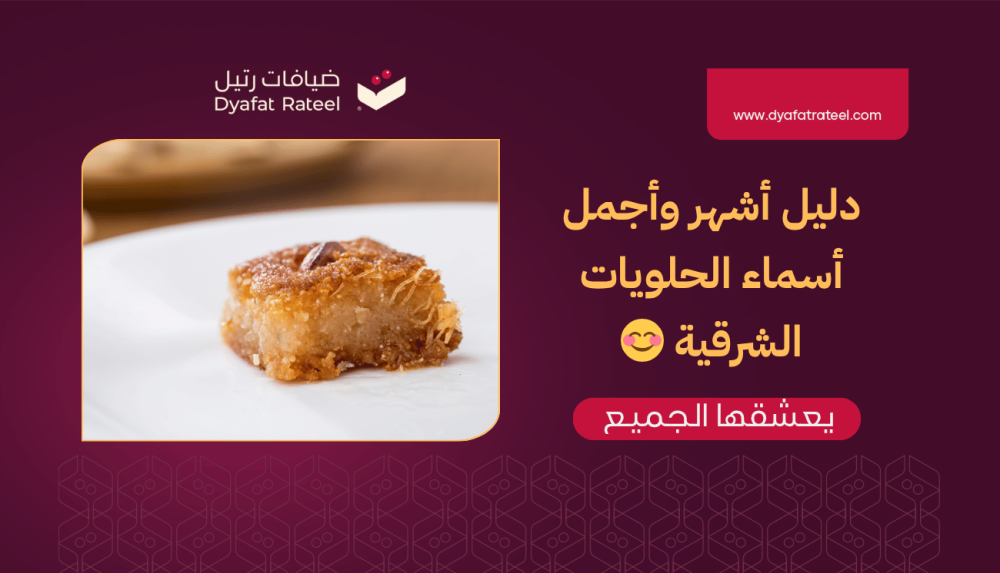There’s no doubt that oriental desserts possess a unique charm that goes far beyond flavor and sweetness — they evoke warmth, nostalgia, and heritage. Each piece tells a story, carrying within it the essence of tradition, an authentic taste, and unmatched artistry. The names of oriental sweets are part of the rich culinary culture of the Arab world — a reflection of societies that master the art of confectionery as if crafting edible works of art.
At Deyafat Rateel, we don’t just serve desserts; we offer a complete experience — inspired by the heritage of our ancestors yet reimagined through a modern lens — to grant our clients unforgettable moments for every occasion or gathering. In this article, we’ll take you on a delightful journey to discover the most famous and exquisite oriental dessert names, uncover the secrets behind their timeless appeal, and help you choose your perfect treat from our luxurious collections.
The Most Famous and Exquisite Oriental Dessert Names
1. Baklava
One of the most iconic oriental sweets, long associated with elegance and hospitality. It’s made of thin layers of phyllo pastry filled with nuts (pistachios, walnuts, or almonds) and soaked in syrup or honey. At Deyafat Rateel, we craft baklava using premium butter and freshly roasted nuts for an unmatched flavor.
2. Kunafa
The undisputed queen of Ramadan desserts. It comes in soft, crispy, or rolled forms, usually filled with cream or cheese, and drenched in blossom- or lemon-scented syrup. Kunafa is a timeless favorite among all oriental desserts.
3. Harissa (Namoura)
Made from semolina, sugar, and coconut, sometimes topped with almonds. Deyafat Rateel offers it in several flavors such as cardamom, rose water, and orange blossom — making it a perfect companion to Arabic coffee.
4. Maamoul
Closely tied to festive seasons, it’s filled with dates, walnuts, or pistachios. Known for its tender texture and aromatic richness from ghee and spices like mahlab, Maamoul remains one of the most beloved oriental desserts in the Gulf and the Levant.
5. Ghraybeh
A soft, melt-in-the-mouth delicacy made from ghee, flour, and sugar. Despite its simplicity, it exudes elegance and sophistication — often served with coffee or during special occasions.
6. Qatayef
A Ramadan classic — small pancakes filled with cream, nuts, or cheese, then fried or baked and soaked in syrup. Its versatility and festive nature make it one of the most popular oriental desserts across the Levant and Egypt.
7. Zalabia (Luqaimat)
Crispy on the outside, soft on the inside — small golden dough balls dipped in honey or syrup. A crowd favorite at fairs and family gatherings throughout the Arab world.
8. Esh El-Bulbul (Bird’s Nest)
A luxurious dessert that delights the eyes as much as the palate. Shaped like a nest and filled with pistachios or walnuts, Deyafat Rateel presents it in a refined, modern style — a perfect treat for elegant occasions.
9. Halawet El-Jibn (Sweet Cheese Rolls)
A Levantine specialty made from cheese and semolina, filled with cream or qashta and topped with syrup and nuts — a divine mix of softness and aroma.
10. Basbousa
A well-known Egyptian dessert made from semolina and sugar syrup, available in variations such as cream-filled, almond, or chocolate. A modern favorite among oriental sweets lovers.
Suggested topic: The Best Mini Cakes for Elegant Gatherings with Deyafat Rateel
Why Do We Love Oriental Desserts?
Oriental sweets are more than just food — they’re symbols of generosity, joy, and celebration. Each recipe carries a memory: an Eid, a wedding, a newborn’s arrival, or a family visit. Every ingredient has a story. At Deyafat Rateel, we revive these emotions, giving each dessert its own identity — through premium ingredients, elegant packaging, and diverse selections.
Frequently Asked Questions
1. What’s the difference between Baklava and Bird’s Nest (Esh El-Bulbul)?
Both are made from phyllo pastry and filled with nuts, but Esh El-Bulbul is shaped like a small nest, while Baklava is arranged in trays and cut into squares or triangles.
2. Can oriental sweets be given as gifts?
Absolutely! Deyafat Rateel offers elegant gift boxes, ideal for Eid, weddings, or special occasions.
3. Are there oriental desserts suitable for diabetics?
Yes, we offer sugar-free options and desserts made with natural sweeteners. Contact us to customize your selection according to your dietary needs.
4. Can I customize the sweets for my occasion?
Yes, we provide personalized catering for weddings, receptions, holidays, and corporate events — including custom packaging and dessert assortments.
5. Do oriental dessert names differ across countries?
Yes. For example, what’s called Harissa in the Levant is Namoura in Lebanon and Basbousa in Egypt. The recipes may vary slightly, but the spirit remains the same.
Conclusion
Oriental desserts are more than recipes — they are living traditions that embody the warmth and generosity of Arab culture. Whether you’re craving a Maamoul that takes you back to childhood or a luxurious Baklava to gift a loved one, Deyafat Rateel offers the perfect blend of authenticity and elegance.
If you’re a dessert lover or searching for the finest oriental sweets to serve at your next occasion, your destination is here. Contact us today — let us add a touch of luxury to your hospitality.



